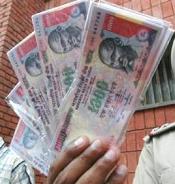 Punita Kumar Sinha, senior managing director, Blackstone Asia Advisors, manages Blackstone's India fund and Asia Tigers fund, with assets of $155.6 million and $ 75.68 million, respectively. In an interview with Vandana, she says the markets will be fairly volatile next year.
Punita Kumar Sinha, senior managing director, Blackstone Asia Advisors, manages Blackstone's India fund and Asia Tigers fund, with assets of $155.6 million and $ 75.68 million, respectively. In an interview with Vandana, she says the markets will be fairly volatile next year.
Last year, there was extreme pessimism in financial markets and valuations hit historic lows, particularly in India and the rest of Asia. But fundamentals in these economies were in a pretty good shape. Attractive valuations, stimulus measures and loose monetary policy created an environment for a sharp rise in equity markets.
I think continuing that will be difficult because the governments are now looking at recovering economies and the next step is going to be monetary tightening and withdrawal of some stimulus measures. Valuations are at above historic averages. They are neither at their highest nor at the lowest level. In this environment, you cannot have a steep rise in markets.
How do you expect the market to behave and what are the concerns that will define market movement in 2010?
I think 2010 is going to be a difficult year. In 2009, regardless of earnings, every stock recovered. We are not going to see that this year, when the markets will be fairly volatile. Right now, valuations are in the fair-value range. If earnings are good, some stocks could still do well.
If earnings disappoint under the backdrop of tightening, inflation and withdrawal of stimulus, some stocks may not perform. I would maintain that the markets are going to be choppy. There are a number of risks in 2010. The first is higher inflation and withdrawal of stimulus. The second is earnings disappointment.The markets are factoring in a recovery in economies and earnings of companies and any disappointment over earnings will not be taken well given the current valuations. The tightening of interest rates is another risk. One should also be concerned about a bubble in emerging markets given that the growth is so strong in India and China.
Capital flows may drive up valuations to risky levels. To avoid this, there are talks of capital controls in emerging markets. I don't think India can afford capital controls. But if the rupee keeps appreciating, the government may think of some measures. For the time being, I do not see such a move. If commercial real estate does not pick up, there could be a crisis in banks that lend to the sector. Also, a lot of paper is lined up, both private and government, which could weigh on the markets.
What will be your sector picks for 2010?
Given the inflation across most economies, especially India, I believe inflation beneficiaries should do well and sectors that are interest rate-sensitive should not do so well. Also, cyclicals, industrials, capital goods and infrastructure-related sectors should continue to do well because the demand within the Indian economy is pretty strong.
Consumer sectors like media, which are related to the recovery of the economy, may do better than consumer durables and FMCG. In pharma, there are some attractive stocks, but it will be company specific.
Do you find the current valuations expensive?
Some stocks are definitely expensive. The markets are far more vulnerable to bad news now because of higher valuations, just as they were vulnerable to positive news during the lows, when valuations were a lot better. At the current levels, it's important that positive news flow continues.
India has historically traded between P/E multiples of 7 and 29 and is currently trading at a P/E multiple of 16-17 times forward earnings, which is in the middle of the range. If earnings deliver, the markets have the potential to re-rate upwards. But they could correct if earnings disappoint, there is an interest rate hike or there is some issue with the global recovery.
The market can got in either direction. India is more expensive than other Asian markets.The consensus earnings growth for India is a bit lower than the rest of Asia. But return on equity in India is much better. I think there are some other markets that are more attractively valued than India. On the growth-valuation ratio, India is in the middle of that range.
How do you see inflows shaping up next year, both foreign and domestic?
At this point in time, a lot of people are taking a "wait and watch" approach because valuations are not that compelling. So, investors will watch how fundamentals pan out and whether the recovery is sustainable or just cyclical. Momentum buyers are still investing but value buyers are waiting and watching for cues.
Last year, we saw significant money flow into emerging markets. I don't expect the same amount of money to flow in this year. There is some momentum buying still, but the magnitude will not be as high as last year. If the economies are growing and the macro picture looks bright, there could be another round of allocations.
Since the lows of March 2009, there have been net inflows of $63 billion in Asia's emerging markets. But during the highs of 2007, there were inflows worth $100 billion. I don't think this is going to happen in 2010.







